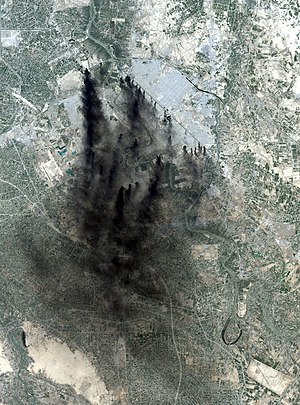Is Nasrallah a 'Palestinian'?
In a post last week, I explained to you the origin of the term 'Palestinian':The term "Palestina" was invented by the Roman emperor Hadrian. The Romans wanted to rename Eretz Yisrael (the Land of Israel) after the Philistines, the longtime enemy of the Jews. Hadrian believed that by renaming the Jewish homeland after the Jews' archenemy, he would be able to forever break the bond between the Land of Israel and the Jewish people.But the term Plishtim has another association in contemporary Hebrew. When one pursues a 'scorched earth' policy one is said to be acting in the manner of 'tamoth nafshi im Plishtim' (let me die with the Philistines). The reference is to the biblical story of Samson (Shoftim - Judges 16:30) in which the blinded Samson collapses a large building, taking revenge on the Philstines who blinded him while killing himself.But even the name of the Philistines, from which the term "Palestine" was adopted, is completely alien to the Land of Israel.
The name Philistines in Hebrew is plishtim, which comes from the Hebrew verb polshim (foreign invaders).
Hassan Nasrallah has apparently decided to pursue a scorched earth policy at the expense of the Lebanese people. Why Nasrallah wishes to exact his 'revenge' on the Lebanese people is not clear to me, but apparently they are the most available target. Despite the fact that he is apparently losing on every front, Nasrallah announced last night that his terrorists plan to shoot rockets "beyond Haifa." Let me assure you that if Nasrallah rockets Tel Aviv it will be InMyBackYard and that you will see "Shock and Awe II" very quickly.

(The image is of the original Shock and Awe - a satellite image of Baghdad on April 2, 2003).
In a televised address on al-Manar in the wee hours of this morning, Nasrallah said "I declare that we will enter the 'beyond Haifa' stage. In the new stage, our attacks will not remain limited to Haifa. Irrespective of the reaction of the enemy forces on the rocketing of Haifa, we will move to the stage of 'beyond Haifa."'
Nasrallah appeared to mock US Secretary of State Condaleeza Rice, who yesterday said that there was no room for Hezbullah or other Islamist groups in the 'new Middle East,' and who implicitly gave a green light to Israel to continue pounding Hezbullah by coming out against a quick cease fire in the conflict.
But Nasrallah is relying upon his human shields to bring about an end to the conflict. Nasrallah believes that outrage over the 'civilian casualties' in Lebanon (and that term is in scare quotes because some of the civilians are not really civilians, and therefore the number of civilians killed is overstated, while the number of Hezbullah terrorists killed is understated - more on that later) is going to sufficiently outrage 'the world' that 'the world' will force Israel to accept a cease fire that maintains or reinstates the previous status quo.
What is unquestioned here is that in the meantime, hundreds of Lebanese, mostly civilians, many of whom may not be Hezbullah supporters, have been dying to save Nasrallah's 'peaceful' neck. Nasrallah's belief is embodied in the following comment about how much time he expects the IDF to have to complete the job it started:
Our steadfastness will change the regional and international reality around us. The enemy won't have a lot of time, no matter what cover the American administration is providing it.Then Nasrallah tries to set himself up as the protector of Lebanese 'dignity.' I wonder how many Lebanese buy into that:
There is no way that we can accept the imposition of any humiliating conditions on us, our people or our country ... especially after all these sacrifices. ... We are open to political discussions and solutions with flexibility, but the dignity and national interest (of Lebanon) is a red line.What a worm.
Meanwhile, Al-AP reports that a 'senior Hezbullah official' made some very candid admissions yesterday:
Earlier, a senior Hizbullah official said the guerrillas did not expect Israel to react so strongly to its capture of two IDF soldiers this month.The fact that Hezbullah expected such a meek reaction only goes to show why Israel's response to this incident should be 'disproportionate.'
Mahmoud Komati, the deputy chief of the Hizbullah politburo, also said that his group would not lay down arms.
His comments were the first time that a leader from the terror group has suggested it miscalculated the consequences of the July 12 cross-border raid that seized the two.
"The truth is - let me say this clearly - we didn't even expect (this) response.... that (Israel) would exploit this operation for this big war against us," said Komati.
He said Hizbullah had expected "the usual, limited response" from Israel.
In the past, he said, Israeli responses to Hizbullah actions included sending in commandos into Lebanon and kidnapping Hizbullah officials or briefly targeting specific Hizbullah strongholds in southern Lebanon.
He said his group had also anticipated negotiations to swap the soldiers with three Lebanese prisoners in Israeli jails, with Germany acting as a mediator as it has in past prisoner exchanges.
Komati also gave higher casualty figures for the guerrillas than the 11 the group has reported so far in the 13-day-old conflict. He said that as of Monday 25 were killed, including 17 in ground fighting with IDF troops assaulting several south Lebanese border towns since the weekend. [Israel has accused Hezbullah of understating its casualties. CiJ]
If Nasrallah really does try to hit "beyond Haifa," Lebanon's reconstruction will take years.









0 Comments:
Post a Comment
<< Home